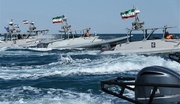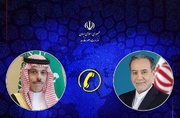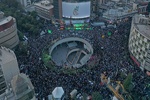In an interview to Payman Yazdani of Mehr News International Service about the recent developments in the Middle East and specially western powers’ and Turkey’s attempts to build military bases in Persian Gulf littoral states, Anthony Cartalucci believed that the overall effect of western influence and presence in the region directly played upon the security of the region and the regional powers were claiming ground in the expense of the US and the west.
Mr. Cartalucci also believed that Persian Gulf Arab countries should come to an understanding of their increasingly shaky conditions in the region in the wake of new global confrontation of hegemonic powers; since their foreign supporters, which Cartalucci believed Arab states totally depended upon, would someday have other options which would also decrease the full support for these states:
Turkey has plans to build a multipurpose military base in Qatar and at same time Britain and France are making their own bases in Bahrain and Dubai. It is said that in new security order defined by the US for the region, the US wants its allies to provide the security of the region. What do you think of this?
This is an increasingly precarious arrangement of interdependence to shore up what was supposed to be a unified front led by the US against Iran and to a greater extent, against Russia and China's influence in the Middle East and North Africa (MENA) region.
What was supposed to be a lightning-fast domino effect starting in 2011 and stretching from Tunisia, Libya, and Egypt, to Lebanon, Syria, and Iran, has become a protracted, costly, and dangerous conflagration the West's allies have found themselves not only entangled in, but now increasingly threatened by.
If the US wants to continue carrying out operations against Syria, Iran, and rollback expanding Russian and Chinese influence in the region, it will have to provide more assurances to those allies it has enlisted to act as its proxies across MENA. Saudi Arabia, Qatar, and the UAE's involvement in neighboring Yemen has shown not only how ineffective the Persian Gulf's armies are, but how dependent already they are on foreign arms and even foreign mercenaries. Despite this substantial foreign backing, the fighting in Yemen remains intense and even spills over the Yemeni-Saudi border on occasions.
Turkey, France, and Britain placing military forces in the region would seem more remedial than anything else.
On Sunday, NATO chief and Kuwait signed an agreement to boost cooperation. What is the importance of this agreement? Is there any link between this agreement and incidents going on in Syria and possible future incidents in Syria?
NATO is but one of many institutions Western special interests are using to advance their agenda. NATO's dealings so far from the Atlantic geographically, shows just how far it has drifted from its mission statement rhetorically and strategically.
Indeed, the agreement has everything to do with Syria, as well as Afghanistan, Libya, Iran, and everywhere else Western forces and their proxies are engaged. This pooling of resources is meant to give the Persian Gulf autocracies the ability to project what little military power they have with the help of NATO's already well-developed logistical networks.
In the end, however, NATO is trading off quality for quantity. As the number of conflicts multiply, and as each conflict expands, the West has found itself with a diminishing capacity to fight. It is now increasingly dependent on collaborators like Saudi Arabia, Kuwait, the UAE, and Bahrain, who at one point in the past depended entirely on the West for their collective defense.
For the Persian Gulf, this increasing weight being placed upon them should raise alarms that their foreign sponsors are becoming increasingly weak. They are being asked to expend more on a grand strategy that is multiplying their enemies at their own expense, leaving them not only widely reviled and spent geopolitically, but also vulnerable when the tides inevitably turn against them.
Will this agreement result in more distrust between Iran on the one hand and Persian Gulf littoral states on the other?
This is a great question, and ties into the previous. Indeed, at face value it will very much increase distrust between the Persian Gulf autocracies and Iran. These deals between the West and their regional proxies are predicated almost entirely on continued confrontation with Iran, Syria, and to a greater extent, Russia and China - despite the much vaunted so-called "nuclear deal."
At the same time, privately, if these nations are truly interested in long-term self-preservation, the "alarms" aforementioned should prompt them to divest from the West's current strategy, and invest instead in establishing a new, proportional balance across MENA, recognizing rising regional powers. By doing so, they can focus on more constructive and sustainable strategies to balance power in the region rather than being pushed into a zero sum game by the West - a game that if they lose the West will escape relatively unharmed while the regimes in Riyadh, Doha, Abu Dhabi, and Manama will be folded over in much the way they once helped do to Libya.
Considering the fact that the real and full security will be restored when all countries in the region as well as Iran enjoy the security, don't you think that NATO's presence in the region will complicate the security issues in the region?
This is another good question. Indeed, NATO and the West's influence in the MENA region in general, is pushing nations into conflicts that benefit the West at the expense of everyone else in the region, both for Western-backed belligerents, and those they are targeting. Iran has proven for decades that it not only has staying power, but that it has been able to develop and project that power despite the best efforts of the West and its collaborators.
What would be in the best interests of all in MENA, would be to strike a balance of power both in the region itself, and between larger powers beyond - not the continued pursuit of a destructive, costly zero sum game that is clearly working against the best interests of all in MENA. At best, those collaborating with the West to wage regional war will be trapped in perpetual conflict, and at worst will be consumed by the consequences of these wars, both directly by opposing forces, and socioeconomically and politically from the costs of waging such protracted, costly warfare. A more rational formula for regional balance is clearly needed, a formula that excludes the West's disproportionate influence.
Interview by Payman Yazdani


























Your Comment